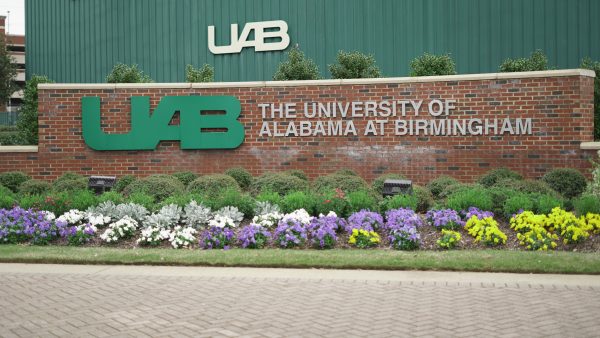Birmingham’s newest voters: how the latest generation is approaching politics
University of Alabama at Birmingham student Charlie Pommerenck had several things to consider when casting her ballot in a presidential election for the very first time. They ranged from the very candidates up for the seat to her own family.
“I am registered to vote mainly because I don’t like Donald Trump,” Pommerenck said while speaking to WBHM last week. “I know that my grandparents are voting Republican so, on top of that, I just want to cancel out their vote if I can.”
A Tufts University survey found that 2020 saw the highest youth voter turnout since the voting age was lowered to 18. It also estimates that eight million new voters are eligible this year. The question of how those first time voters in the Birmingham area are approaching this election remains.
WBHM spoke with about a dozen students who generally agreed that they registered because they believe it is important to practice their civic duty.
“Being a Black woman in the community and being able to use my voice is very important,” Olivia Walker said.
But each had their own reasons.
“I intend to vote as soon as possible on November 5th,” Brandon Amaya Ortiz said. “And I don’t want to forget about that.”
“My mother made me,” Mikeyla McClam said, with a smile. She added that voting is a privilege and she registered once she turned eighteen. She agreed with fellow classmate, Dylan Douglas, that they have an opportunity to have a say in who will run the country for the next four years.
“I just feel like our voice matters,” Douglas said.
While Alabama is not a swing state, these students represent an up and coming generation whose voices have not yet been heard in the political world. And this demographic of voters has already proven that they can make an impact.
An NBC poll suggested that 65 percent of adults between the ages of 18 and 24 voted for Joe Biden in the 2020 presidential election. Biden went on to win that election. This came shortly after a New York Times article bemoaned the lack of young voters in the 2016 election.
That Tufts survey found most states are seeing fewer young people register to vote this year than in 2020. But Annie Kelley, director of the Samford University branch of the League of Women Voters, has seen plenty. She had sympathy for incoming freshmen this year.
“It can be kind of difficult being at school your first year,” Kelley said. “And then it’s an election year. And you are trying to figure out how to navigate yourself as a person.”
The Stamford University branch of the League of Women Voters tries to help keep new voters abreast of election knowledge. But Kelley said they also focus on mediating unity through debates and speakers from both sides of the political aisle.
“We are all one nation, one people,” Kelley said. “And yes, we have our differences. But ultimately, I believe, everyone on the political spectrum, they want to do what’s best for America. They do it differently, they have different approaches, but ultimately that’s what everybody wants.”
Kelley says from what she has observed, her generation is pulling away from polarized politics and trying to find common ground.
“We’re going to be the ones bringing politics into the next generation,” Kelley said. “We’re the ones taking up that mantle now.”
Trump announces ‘major combat operations’ in Iran
Israel and the U.S. have launched strikes against Iran, with explosions reported in Tehran and air raid sirens sounding across Israel.
Trump says he is ‘not happy’ with the Iran nuclear talks but indicates he’ll give them more time
U.S. President Donald Trump said Friday he's "not happy" with the latest talks over Iran's nuclear program but indicated he would give negotiators more time to reach a deal to avert another war in the Middle East.
Bill Clinton says he ‘did nothing wrong’ with Epstein as he faced grilling over their relationship
Former President Bill Clinton told members of Congress on Friday that he "did nothing wrong" in his relationship with Jeffrey Epstein and saw no signs of Epstein's sexual abuse as he faced hours of grilling from lawmakers over his connections to the disgraced financier from more than two decades ago.
Pentagon puts Scouts ‘on notice’ over DEI and girl-centered policies
After threatening to sever ties with the organization formerly known as the Boy Scouts, Defense Secretary Hegseth announced a 6-month reprieve
President Trump bans Anthropic from use in government systems
Trump called the AI lab a "RADICAL LEFT, WOKE COMPANY" in a social media post. The Pentagon also ordered all military contractors to stop doing business with Anthropic.
HUD proposes time limits and work requirements for rental aid
The rule would allow housing agencies and landlords to impose such requirements "to encourage self-sufficiency." Critics say most who can work already do, but their wages are low.








